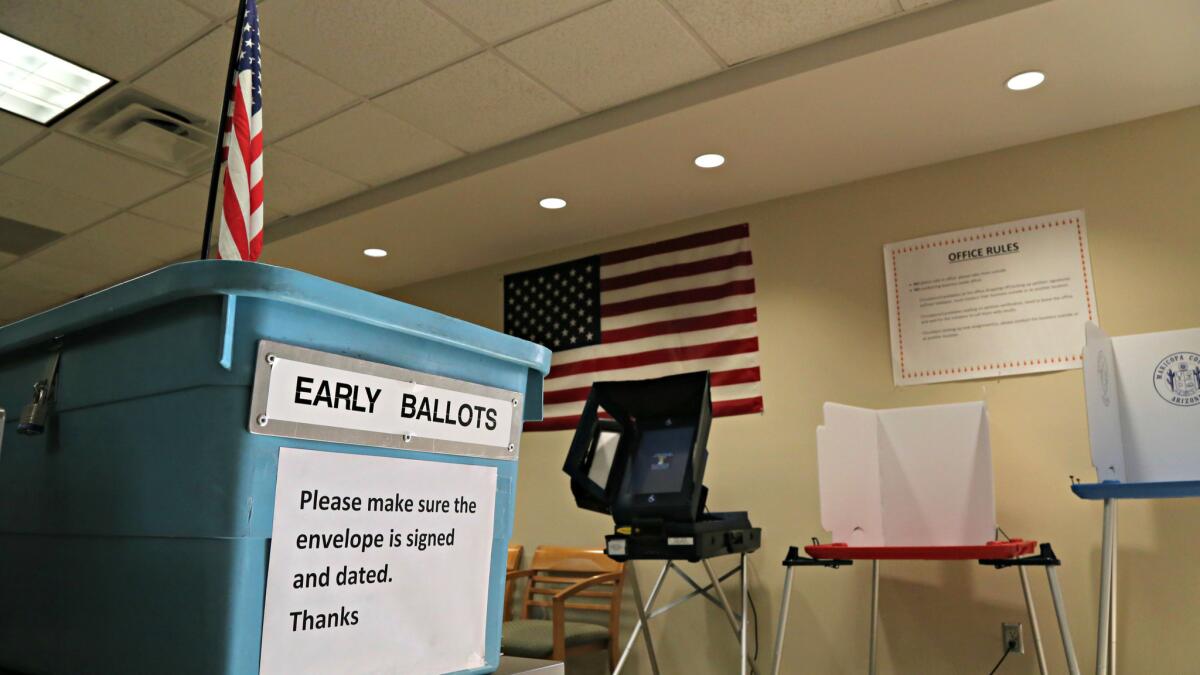Opinion: Improve voting — by limiting it?

To the editor: Although I agree that too many poorly informed people vote, the author’s solution is subject to gross abuse. It is easy to imagine, for example, those in government who favor big government altering the test so that more such people get to vote. The system would then perpetuate itself.
( “Can knowledge-based voting fix democracy?” Opinion, Aug. 28)
We need a way to get fewer poorly informed voters. Young people, almost by definition, know less than the more mature. Raise the voting age to, say, 25. Problem solved.
Dwight Filley, La Jolla
::
To the editor: Establishing a political exam to see who’s best qualified to vote is inherently discriminatory and shortsighted. The central premise, “We get better policies with a better informed electorate,” sounds good, but his example that high information voters tend to support free trade is a tip-off to the problem.
Information is not the same as discernment or perspective. Voting the way most politicians, economists, bankers and corporations think we should is not the same as voting how most environmentalists, human rights activists, small-business owners and artists think we should.
In this era of global warming, widespread pollution, resource depletion, growing income and educational disparity, food and health crises and 2nd Amendment conflicts, our democratic process should encourage more participation, not less.
Jack Cooper, Studio City
::
To the editor: The opinion piece outraged and mortified me. His basic ignorance belies his use of big words.
His assertion that “how any one of us votes does not” matter is insulting and inept.
A rich trove of voters arises from millions of people who make their wants and needs known by participating in elections in an effort to make our country a more perfect union.
As for what makes good voters, consider this a definition: the American citizens who care enough about their country to become informed on the issues and show up at their polls and make their voices heard by voting.
Sarah Turitto, Cardiff
::
To the editor: The threat that someone as dangerous, yet as popular, as Donald Trump could be elected president spotlights the big problem inherent in our democratic elections: too many un- or underinformed voters are susceptible to devious emotional appeals and too often vote against their own best economic interests.
Jason Brennan’s call for an epistocracy where a voter would essentially need to show citizenship competency in order to vote would largely solve this problem. Passing a citizenship exam or other such qualifier would be a fair nonpartisan standard and then requiring each eligible voter to vote or face a heavy fine (as in some countries) would assure maximum turnout.
When so much of the electorate fails to vote, we need to upgrade voting standards to coincide with its crucial importance in deciding who will be the leaders of the most powerful country on Earth.
Bob Loos, Silver Lake
::
To the editor: As long as we are fantasizing about radical changes that create a better democracy, here is a modest proposal.
First, extend the term (length) of service office to 10 years. This will automatically cut the cost of running elections and increase their importance.
Next, each successful candidate (with greater than 35% of the vote) serves in a preset proportion to the votes.
Term limits should be abolished. As long as the people want a candidate, they can vote for him/her.
Finally, monetary donations should be accepted only from individuals who can cast a vote. No organizations, corporations, PACs, etc.
James H. Benson, Altadena
::
To the editor: I agree fervently with Brennan’s call for the ascendancy of informed and incentivized voters, but his position is undercut by proposals that are amorphous, nebulous and largely inchoate. (Brennan and other qualified voters will get my meaning.)
Try this: I am remarkably intelligent, broadly conversant in fields ranging from political theory to physics. I am deeply and perpetually informed in all aspects of national and world events.
As a compulsive autodidact, I never quit updating and expanding my knowledge. Why not simplify the creation of an epistocracy by appointing me sole elector?
And the process can be even further condensed: Because I am incapable of lying and am entirely immune to the ordinary temptations that come with power, I am the ideal candidate. I could simply vote for myself.
Stephen Mattson, Los Osos
::
To the editor: As George Orwell wrote in “Animal Farm” :
“All animals are equal, but some animals are more equal than others.”
Boris Buzan, Mission Viejo
Follow the Opinion section on Twitter @latimesopinion and Facebook
More to Read
A cure for the common opinion
Get thought-provoking perspectives with our weekly newsletter.
You may occasionally receive promotional content from the Los Angeles Times.










